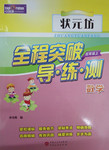题目内容
阅读理解。
Long, long ago there was no zero. To write the number sixty-three people wrote 63. To write six hundred
and three, people wrote 63. The space between six and three was there to mean." not any"tens. Sometimes
people did not remember the space. It was hard to see and read.
Later people used a dot to hold the space. Six hundred and three looked like this 6.3. But the dot was hard
to see. So people put a circle around it like this 6⊙3.Then people could see the dot. They remembered the space. at last, only the circle around the dot was used. It was like a zero. This is one story of how the zero came to
be used.
Now zero has many important uses. Zero tells how many. Can you tell some other ways of using zero?
and three, people wrote 63. The space between six and three was there to mean." not any"tens. Sometimes
people did not remember the space. It was hard to see and read.
Later people used a dot to hold the space. Six hundred and three looked like this 6.3. But the dot was hard
to see. So people put a circle around it like this 6⊙3.Then people could see the dot. They remembered the space. at last, only the circle around the dot was used. It was like a zero. This is one story of how the zero came to
be used.
Now zero has many important uses. Zero tells how many. Can you tell some other ways of using zero?
1. Long, long ago, people didn't know how to ______.
A. write
B. write zero
C. write numbers
D. sixty-three
B. write zero
C. write numbers
D. sixty-three
2. Long, long ago if they wrote two hundred-eight, people wrote ______.
A. 28
B. 28
C. 228
D. 208
B. 28
C. 228
D. 208
3. Later ______ was used to mean space.
A."not any"
B. letter "0"
C. zero
D. a dot
B. letter "0"
C. zero
D. a dot
4. People used circles ______.
A. to remember ways
B. to remember numbers
C. not to forget the space
D. to mean nothing
B. to remember numbers
C. not to forget the space
D. to mean nothing
5. The story tells us ______.
A. how zero came to be used
B. how to write zero
C. what`s the use of zero
D. that zero means a dot, a circle or space
B. how to write zero
C. what`s the use of zero
D. that zero means a dot, a circle or space
1-5 BBDCA

练习册系列答案
 状元坊全程突破导练测系列答案
状元坊全程突破导练测系列答案
相关题目